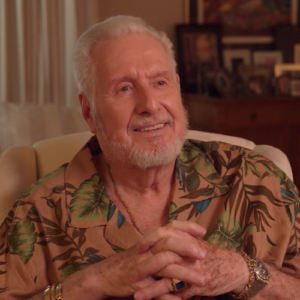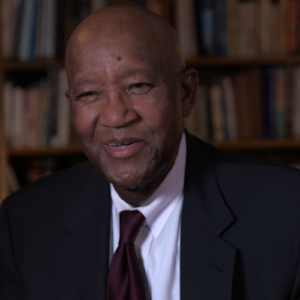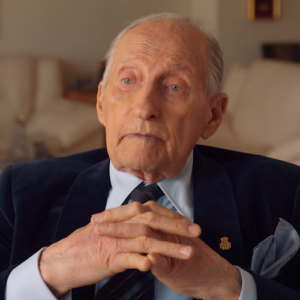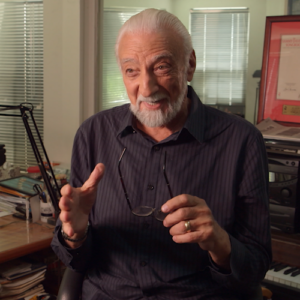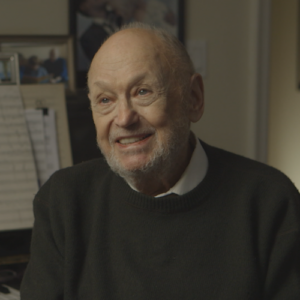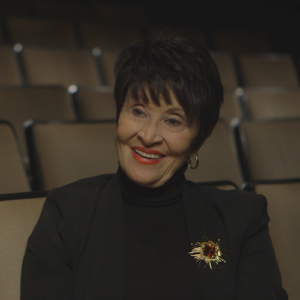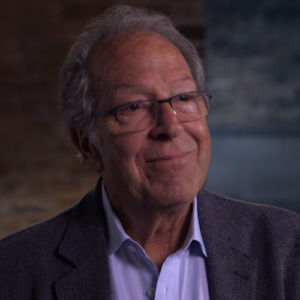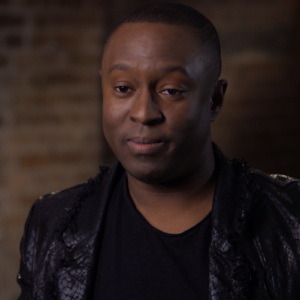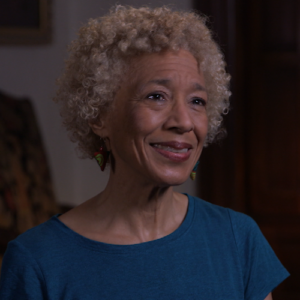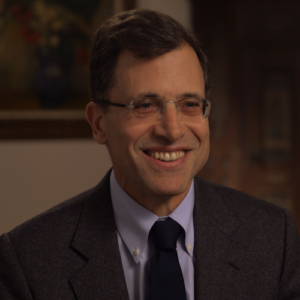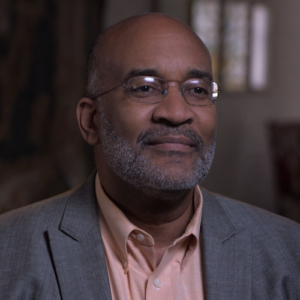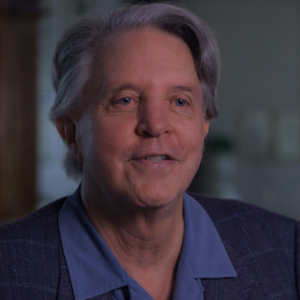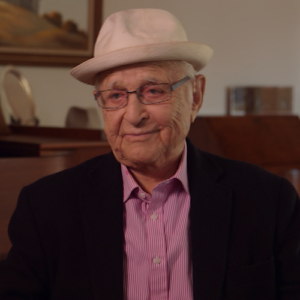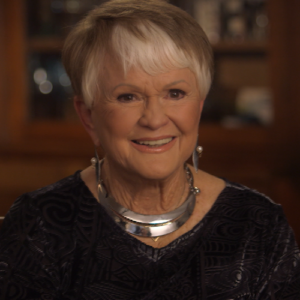Interviewer: Thank you for doing the interview. First question, would you first become of the standard edition you would have never as.
David Kaufman: I first became aware of Sammy Davis Jr when I was very young, he grew up in the sixties and seventies. He was already a major star. I would have been bar mitzvah age in the year that he appeared on All in the Family, which by the way, was the same year that he appeared with with Richard Nixon at the Republican Convention. But I doubt I would have been watching that at that age. I know on the other hand, I was a big fan of all the family and good, good chance. That was the first time I saw Sammy Davis or anything.
Interviewer: Think when senators.
David Kaufman: Saw him, he was he was a cool cat and there was no question that he he made his presence known. But being a nice Jewish boy from Brooklyn, New York, I have to imagine that as as impressive as was the famous kiss when he laid one on Archie Bunker at the end of that episode. There was a moment in their conversation when Archie Bunker is saying all sorts of inappropriate things to him that he says to Sammy, I know you were born a colored man, but why did you have to go become a Jew? I just have to believe that hearing that word Jew on television in the early 1970s of not only made an impression on me, but I have to have to believe me, an impression on a lot of people.
Interviewer: Well, why? Why do you think it did?
David Kaufman: Well, because that word, which today is relatively common and acceptable, even as late as the seventies was still there was still somewhat of a taboo in place about being too Jewish. Right. That’s the famous show business admonition not to be too overtly, too conspicuously Jewish. It’s worth pointing out that that was almost always said by Jewish television and film executives to their Jewish stars, Don’t be too Jewish. Or in the case of television, we had the decade the Sixties, where Jews were working throughout the television world, and yet there was little to no explicit mention of Jews or Jewishness. So at that point on Archie Bunker, which was such a groundbreaking show to begin with, that was part of what made that episode subversive from my point of view.
Interviewer: Great, great. So let’s go back historically, let’s talk about the relationship between blacks and Jews in America through the end of World War Two. What was that relationship like?
David Kaufman: Well, it’s the relationship between the black community and the Jewish community in the United States in the first half of the 20th century is is complicated. One, it’s fair to say that those who criticize one group or the other, there’s some measure of truth. For example, those who point out that Jewish talent agents and producers and there’s now talking in the realm of show business, the the accusation that some of them exploited or otherwise cheated their black clients. There’s some truth to that. And there was some some measure of one community benefiting from the from the from the degradation of the other. So I don’t want to sound Pollyannish and and talk about a relationship that was nothing but flowers and and happiness. On the other hand, I think it’s safe to say that of all of the white minority groups in the United States at that time, all of the various immigrant groups and ethnic groups that of them all the Jewish community was easily the one most open to their black neighbors are open, and I want to say tolerant. We see that in the in the residential patterns. For example, when the Great Migration begins of African-Americans from the south to the north, they quite often will move into neighborhoods with where Jews live. And there’s the reason for that is the Jews are open to them as neighbors. So that’s a positive. And it was often said in an African-American studies, one of the things that we hear again and again is that growing up black in America, in that period, one new five, one knew five white people. You knew your landlord, you knew the shopkeeper, you knew the schoolteacher, you knew the social worker, and you knew the cop. Of those five, the first four old Jews, probably Irish, right? But of most of your contacts with the white population are with Jew. So in a very powerful way. Jews come to represent white America to many black people, especially as they move into the Northeast, into the popularly Jewish population centers of the major cities of of of the Northeast. So that relationship is there from the start. Again, as I say, it has negative elements as well as positive. But I as a historian, I’d like to suggest that the positives outweigh the negative, that the participation in civil rights that is in that is characteristic of Jews. In the late fifties and sixties, the height of the civil rights movement has its precedents all the way to the beginning of the century, where Jews were heavily and Jews were founders of the ACP Jewish man founded the Tuskegee Institute and so forth and so on. There are all sorts of examples of what might be called Jewish benevolence toward the African-American community. Now, of course, the black condition in America remains oppressed throughout much of that century, and Jews as white ethnics benefit from their skin color and are able to move upwardly socially, climb upward, are able to be socially mobile in a way that the black community cannot. So again, we see a lot of of inequality in these in the mood, the relative movement of these two groups. One of the areas in which they come together often to mutual benefit is in show business. And I think it’s very important to just to understand the entertainment industry as an arena for the expression of of minority groups, the the the ability for them to rise above their the the economic conditions of their community and to to make it to succeed in the general society. Jews feel this that Jews react to this very quickly so that we see in the early 20th century a veritable explosion of Jewish entertainers, stage performers, singers, dancers, comedians, etc., who in order to make it find their way through, through show, show business, there is an entire circuit of Black Entertainment at the same time. As I said earlier, for blacks, there isn’t the same range of opportunities. But for the Jews who who are beginning to move up in that regard, it’s their liberation. It’s their opportunity to be to to grab on to the American dream and run with it. And many do. And some of the important names in that history become important in the life story of Sammy Davis Jr, Al Jolson, Eddie Cantor, Jerry Lewis, Danny Kaye, etc. These are all major stars of that early period who serve as a precedent, as a role model, and ultimately as direct mentors and friends to the young Sammy Davis Jr.
Interviewer: Good answer. What did the African-American population that was involved in the entertainment world contribute to show business up to the mid 20th century? Your perspective?
David Kaufman: Well, let me go back and add something first. It’s worth pointing out also that the the the young Jewish entertainers who were rushing headlong into into that world were usually second generation. That’s to say they were children of immigrants. So there were only one or two at most generations removed from the experience of the old country. And for those Jews, for that population of mostly East European, Yiddish speaking Jewish immigrants who arrive en masse at the turn of the 20th century, it’s important to recall that in Europe they were the blacks of that of that community, of that society. They were the ones who were ghettoized. They were the ones who had no chance of attaining full equality in those in that culture. Coming to the United States, on the one hand, is incredibly liberating for them. Here at last is indeed the promised land, where there is for them the possibility of equality and opportunity. They, as I said earlier, they they rush headlong and oftentimes make a success of themselves. But at the same time, they see black Americans as an echo of the life they had left behind. I think it’s important to understanding if we assume that there is an affinity that many Jews have for their fellow African. In American citizens. It’s one of identification. Many Jews will look at their black brothers and sisters and see themselves in that experience. It’s not a it’s not a direct analogy. It’s not a perfect analogy. But I think it helps to explain the relationship. And before we get to Sammy Davis Jr, it’s important to have a feel for that.
Interviewer: Yes, you’ve led me to my next question. And the question is what was it about Wilson and the cancer? You know, that appealed to young Sammy Davis was about these these Jewish reformers that appealed to this young Sammy Davis Jr.
David Kaufman: Yeah, Well, there’s no question that Sammy Davis Jr looked up to those major stars of the first decades of the 20th century as role models of Al Jolson and to a slightly lesser degree, Eddie Cantor were the pop superstars of their day. They were the Michael Jackson’s and the princes of the 19 teens and twenties. So Sammy Davis coming up at a time where they were his immediate predecessors and to some degree contemporaries. There’s no question that he saw in them. A model of success for an outsider group in America. Clearly when these same individuals then recognize his talent and take him under their wing and make him into their protege, then the deal is sealed. It’s a two way street. They fall in love with him and he loves them back for it. And that relationship becomes a part of him, there’s no question. I think in addition to that affinity that they feel for each other’s talent and ambition. By the way, in other words, Sammy Davis said it again and again that he has every intention of becoming a major star in the mold of Al Jolson, Mr. Entertainment and so forth. And in fact, Sammy Davis Junior will later be given the same label, Mr. Entertainment. In addition to that, there’s also the the question I’m sure you’re planning to get to this, but the question of blackness and what on earth is that about? You know, when when we show old film clips to our students nowadays, first of all, they’re shocked that such a thing ever existed. And secondly, they’re baffled, really perplexed. What were what did that mean? What does it mean? What did that mean to audiences at the time? How did it come about? It’s a very, very complex issue, and I don’t think I’m able right now to give you the sum total of that history and of the various I mean, this tremendous amount of scholarship and interpretation of it. I would boil it down in the following way. I would suggest that. Well, first, let me back up and remind remind you that the history of blackface minstrelsy goes back to the 19th century. It was a long time tradition of American stage entertainment, which by the beginning of the 20th century had begun to die out. It is revived in the early 20th century, largely by Jewish entertainers. So some historians will go so far as to call this moment and this period of blackface entertainment, Jewish blackface, Al Jolson, Eddie Cantor, George Jessel, Sophie Tucker, and so many other now forgotten performers of that era. I applied the burnt cork to their faces as a matter of course, it was. It became such a norm. It became so standard that one didn’t think about it. Yet we look back and have to wonder what what’s going on. So let me give you a few possible explanations. One is what I said earlier the Jewish affinity for African-Americans. They saw in the black experience echoes of their own, beginning with the common experience of slavery. Obviously, for black Americans, slavery was much more recent and much more real. For Jews, it is this ancient narrative that that is becomes part of the Bible and then becomes part of the Jewish religion. And so the memory is preserved for centuries and centuries, but still 2 to 2 Jews who observe their religion in some meaningful way. It is it is a reality to this day. So the notion that these are two peoples who both experience the worst form of human degradation, who both emerged from that experience were liberated, went through an exodus from slavery, and since then are on the path through the wilderness to try to to to reach the promised land. One hears this kind of language and any that in any black Baptist church you hear this this parallel being made constantly. I think Jews may have made a similar comparison and saw in black America of their image. So by putting on blackface, they were embodying they were taking on an identity with which they identified, which they saw as their inner essence, their true selves.
Interviewer: So, yeah. So this is an image of Sammy Davis, who needs like a four or five year old, and he’s got.
David Kaufman: On black rice.
Interviewer: What does that say in terms of a black person? Brian Williams did a Brian Williams writing the right performance. Did it.
David Kaufman: So I am a little confused. Yeah.
Interviewer: No, I mean, I. But I want you to articulate for the audience instead of all of that in terms of minstrelsy, in blackface, a black performer, a young man, four years old, five years old, Sammy Davis, Jr, wearing blackface.
David Kaufman: You you raise an important question, a side question here, which is in this moment of Jewish entertainers taking on the convention of blackface, how do we read in that very same moment the application of the same technique, performative technique by black performers? I think one has to look at the inherent racism of America at that time and for a long time afterward in terms of the inability of a white audience to accept a black person as someone who is making them laugh, who was entertaining them, who in some measure in some way has power over them in that moment. Entertainment is a form of empowerment. And for a black performer to to to to embrace that was was a threat to a white audience. And we’ve call that explicit or implicit racism. It’s a form of racism either way. But I think that helps explain. And that also then sheds light on why the Jewish performers are doing it. They, too, are knocking them dead. They, too. Al Jolson was famous for having an audience in the palm of his hand. The control that suggested Sammy Davis Jr would later write about Jack Benny in a similar way that he could mold the emotional response of any audience to his liking. There’s a lot of power in that. In the 19 teens and twenties, both blacks and Jews share a common subsidiary status in American culture. And both of them may be applying blackface for similar reasons so as not to pose that direct threat to putting on the. Mask of Black subservience. The Sambo There’s the Stepin Fetchit persona that was that that archetype of Black inferiority. By putting on that mask, they wouldn’t no longer be a threat to their audience. It was a safety device. I think you have to add to that a couple of things, right? So I started off by saying, why are these Jews putting on blackface? Well, one reason is that they shared and everything I said is, as an example, they shared much in common with their fellow black performers. I think it’s worth adding to that. The more negative, which is that and this is some writers on this topic have emphasized this, that in order for Jews who when they when they got off the boat as immigrants, they were white in the eyes of white America. They were still outsiders. They were still seen as people of color. Right. So in order for white ethnic groups to attain whiteness, to attain the social status of the white insider, that’s a process that takes a generation or two. And in the case of these Jewish blackface performers, they were this is one theory. They were applying the blackface as a way to emphasize their whiteness.
Interviewer: I like the other one.
David Kaufman: I’m with you. I’m with you. I like the other one better. But let’s, you know, let’s be on. Let’s let’s be try to be comprehensive here and include a number of these different possibilities. I want to add a third, though. And third is actually my favorite. And that is and this goes is going to go to Sammy Davis. I think the you know, when Sophie Tucker talked about applying the blackface and she was she was became so famous. Sophie Tucker was a Jewish woman who who was one of the last the last of the red hot mamas, great entertainer. Part of that Al Jolson Eddie Cantor moment. She became well known as the excuse me for the term as the Coon singer. And that was her rise to fame was was as a blackface performer. She used to at the end of her set, she used to peel back the glove to show the white wrist. And people in the audience gasped. They couldn’t believe she was really white. So I think some people were being fooled. But, you know, that was the that was the joke. And if you were in on the joke, you knew that they were really white. So what you as an audience are seeing is someone pretending to be black who, you know is really white. But the you know, in that moment of, you know, what’s called when you’re watching a film, the suspension of disbelief, that for the moment, if they’re effective, you forget that for the moment and then suddenly something reminds you that they’re really white. So what blackness is about is it dissolves that clear black or white nature of identity. You’re either or. Usually we like to think about identity and the the performance convention of Black face challenges that it says no identity isn’t black or white. Identity is always in flux, can always be played with. I’m going to trick you about who I really am and what and who I really am inside by playing another character in a certain sense. All entertainment is about that. Whether it’s a movie or a play or stage performance, there’s that tension between what’s real and what’s not. And what makes it work is when it’s playing right on the edge and black face does that. So to me, for my money, that’s what Black is really about. It’s the quintessence of entertainment.
Interviewer: It’s a very good answer.
David Kaufman: Yeah. Glad you like it. Yeah.
Interviewer: So, yes, it is sending a young man in this service. He’s being beaten, nose broken, painted, white, humiliated. Yeah. The only thing he has is his. His talent. To entertain the troops, to entertain the soldiers. He uses that mimicry to do it. I mean, you know, what was that going to do for him? What was he hoping that was going to do? What did it mean for Sam?
David Kaufman: Well, first of all, regarding Sammy’s experience in the Army, first, you have to note that until he gets to the Army, he’s largely insulated from the pervasive racism of American society, the society his father and Will Mastin, his so-called uncle, did a wonderful job of protecting him. And so, for example, when they were not able when there was a restricted hotel, the his father and uncle would say to him, well, it’s because they resent us, because we’re performers, not not because we’re black. Right. So so he was largely protected. And therefore, the Army’s that much more of a shock to his system where he’s confronted with outright racist, bigoted. I want to say assholes, but I can’t say that. It’s also important to read his account of the Army in Yes, I Can. He describes another young black recruit who is his, I think, as I recall, the other black soldier in the unit. And as soon as they start getting trouble from these white soldiers, these this other guy reverts to a very obvious and stereotypical form of black behavior, again, subservient to to to the white master. And Sammy sees this and is appalled, understandably, which again, is testament to his having been relatively untouched by that part of the culture. But he is just disgusted by what he sees as this this behavior. Of course, that other soldier was doing it to survive, and that’s what many black Americans had learned to do for their own survival. Sammy, on the other hand, did not have that that training. He did not have that kind of background. So he has to fall back on on what his talents are. He begins as many. And this, by the way, is a story repeated over and again in the story of Jewish entertainers that when they were in the army, faced oftentimes for the first time with anti-Semitism, they they managed to avoid beatings and other problems by being funny, by being entertaining. Many Jewish comedians get their start in the Army. Sammy Davis Jr is no different. He realizes intuitively, probably, that that his talent is a way to, um, to, to, to, to slow, if not stop the the fist of persecution. And he has for the first time in his life, he has that experience of his talent as a shield, as a protection. Now mimicry is something else again in the history of entertainment. Sammy Davis Jr is one of the great mimics. Imitating impersonating famous personalities is today a standard? It’s convention of show business. All of the great comics did it at one time or another. Sammy Davis is one of the great. But in a funny way, he has a kind of advantage in being black, because when as a black man he does a famous white person in addition to the the the great pleasure that gives wow, what a perfect impersonation there is. At the same time, the shock to the white audience of seeing Sammy cross the color line in that moment. So he is doing a kind of reverse blackface. He’s doing whiteface in that moment. And it and for many of the same reasons that blackface had a communicative performative power. So does that does that statement on his part? If you go back and you look just a few years after he gets out of the army, if you look at the early TV on the TV appearance, you couldn’t get the word. You look at those early TV appearances on the Colgate Comedy Hour of the young Sammy Davis with the Will Mastin Trio and you. In that early. I think it was 1951, just a few years into the post-World War two era. And you see him on national television do his Jimmy Cagney do, his Jimmy Stewart do. Danny Kaye and Jerry Lewis do all these famous white celebrities. It is it is enormously powerful to see this young black man doing it. Because, you know, at some level that in that era, even though we’re hopefully more enlightened in the 21st century, a half century or more ago, most of white America still preferred to see black people in a in an inferior way. And here is the comedian, the entertainer pulling a fast one on them, showing them how incredibly smart and talented and brilliant he is in a way that no other black entertainer was doing up until that point. It was absolutely revolutionary of Sammy to do it, and it has to be seen as an important moment of softening the ground, of changing consciousness for the rest of America.
Interviewer: Was it also waves of assimilation for Sam?
David Kaufman: Well, that’s yeah, that’s a great point. One of the reasons that the way the way in which mimicry impersonation is a symbolic form of social and cultural assimilation. It’s crossing the line of identity. I’m not an immigrant. I’m now an American. I no longer speak with an accent. I speak like other Americans. Right. Once one makes that transition, that’s what sociologists call the process of assimilation. You’re assimilating the new culture. In the process, you’re shedding your old culture. That’s that’s the American tale, is it not? The great thing with Sammy and I’ll come back to the question of of mimicry, but he was one of the one of the ways in which these various entertainers mentored him was they they they gave him advice. They they wrote. I think it was Jerry Lewis who sat in his before his nightclub performances and took notes on the back of Zero’s program and would would come backstage afterward and share his notes with Sammy. And one of the things that these mentors shared with him was the was that he was going too far. He was speaking English too well, too perfectly, almost with an English intonation. And they said, you know, you’re you’re going you’re, you’re compensate, you’re overcompensating, and you really need to be yourself.
Interviewer: This kind of intro. Yeah. Yes. On the other hand, he had his uncle and his dad saying, Don’t do those white guys.
David Kaufman: Well, that’s it.
Interviewer: First he’s got, then he’s got to later on Jerry Lewis. And I’m saying, don’t be too, too eloquent, you know. So it’s like a weird kind of thing. That same. He’s got to be fighting against all odds.
David Kaufman: Yeah, well, you. You bring up the fact that his father and uncle are uncomfortable at first with his impersonations as black men of the earlier generation, they’re still nervous. They’re still fearful of what it would mean to their white audience for them to seem uppity for that may It’s the equivalent what I said earlier about two Jewish. It’s being it’s for a black man. You’re being too white. Right. So the white audience only gives a certain amount of leeway in that regard. So will Marston and Sammy Davis senior at first put the brakes on. They said to young Sammy, don’t be too uppity. Right. They they were echoing the white oppression that very quickly is dissolved when he sneaks it in to the act. I think it’s his Jimmy Cagney impression. He does first. And it’s a big hit. And that’s the nature of show business. Whatever works, you keep. And so that it was his successful rebellion that just built from there. And more and more, he becomes more comfortable doing those impressions and they become a bigger, bigger a part of the act. And then when white performers like Jerry Lewis and Frank Sinatra and Mickey Rooney and others get hold of him by that point, that he’s become that breakthrough star and they generally only encourage it if they tell him not to talk, not to speak with to perfect addiction and to perfect English accent. It’s only because they were concerned that that would put off the audience because it wasn’t real, it wasn’t authentic. You’ve got to be true to yourself. That was that was their point.
Interviewer: That’s good to hear. The cancer that I have in the fifties, late fifties. Really? Remember, can’t.
David Kaufman: Get in the old movies. Yeah, well.
Interviewer: The old movie. So. But he had this. The Colgate comedy. I always said, yeah, it gets on his show and has the classic where after sandwich performance he embraces and they wipe Sammy’s brow. So it’s about Eddie Cantor and who he was. And what’s the significance of what cancer did accepting Sammy so publicly?
David Kaufman: Yeah, well, Eddie Cantor, like Al Jolson, was a major star of the 19 teens, twenties and thirties. It’s important to keep in mind the various media by which he attained stardom. He starts off in saloons on stage, the kind of immediacy of a nightclub performer that can connect directly with his audience or her audience. Secondly, they became radio stars. And there again, there’s a kind of intimacy that radio brings to its audience. It’s in your living room. You’re glued to that radio set, your your hearing, the very often the the personal stories and family vignettes of these these great radio performers. So people like Eddie Cantor, Al Jolson, Fanny Brice, George, George Burns, Jack Benny, all made their first became national stars on radio. And that’s that’s, I think, important. It’s important to understand that once television comes in, in the fifties and once many of these people make the attempt to transition to film as film stars, as Eddie Cantor make, makes 20 or so films doesn’t translate to the same degree. That’s to say the reason for their initial fame doesn’t doesn’t last, doesn’t persist into these other media. And so in the fifties and sixties and thereafter, these figures were largely forgotten. What they had accomplished on stage and on radio primarily did not have that kind of staying power. So we as a culture, for the most part, forgotten. Now, that’s not to say that they weren’t a tremendous influence on the young Sammy Davis Jr in a certain way. He he he inherited their legacy and carried it forward.
Interviewer: I mean, what was your reaction to to to Panthers.
David Kaufman: Embracing Sammy so.
Interviewer: Widely this grow from the Yeah television audience.
David Kaufman: Watches again again that that performance first of all the the national exposure that television provided was powerful in itself. And so those early TV shows, the Milton Berle show, the Sid Caesar Show, the Colgate Comedy Hour, which had alternating guest hosts, Eddie Cantor being one of them. It was it’s in this age of the Internet, it’s hard to imagine to remember how earth shattering was this new medium of television. One could become an instant star by appearing on shows. The Ed Sullivan Show will later become well known for that. But it’s true also of the earlier fifties, when Eddie Cantor invites the Will Mastin Trio onto his show. He seen them perform live. He knows how phenomenally talented young Sammy is. He knows what a hit they will be. But he also knows that this is crossing a line, that he’s he’s boundary breaking by inviting black performers onto white television. It’s further boundary crossing in that it’s not the typical black act. Sammy Davis is, as I’ve described earlier, is doing something radical in that moment by taking on the persona of white performers. He eschews the typical stereotypical black speech and instead steps right in to the speech patterns of these very famous, revered white figures. He puts it on like blackface, and the effect is so powerful. So that’s the first step that Kanter gives. Sammy Davis, that platform, that national exposure, by having him on his show, that’s already an imprimatur, a sign of acceptance. And then to further to deepen that, he brings them out on stage after their act, to stand with him in front of the cameras, slings his arm around Sammy Davis as if he’s his malaise is and I say that in the best possible way, as if this is his his own son and that embrace and then famously the wiping of the brow, using his own handkerchief. And I guess I guess it was shocking to people because of the bodily fluids on on a handkerchief. I think more importantly, it’s the gesture of affection, putting the arm around him. Wiping his brow. Being parental. And I don’t think it’s too far of a stretch to suggest that Eddie Cantor becomes a kind of father figure to the young Sammy Davis Jr. Eddie Cantor representing that tradition of getting out of the ghetto by being fantastically entertaining, by being emotional to the max. The emotionalism of those performers was what marked them and the ability to sing, dance, tell jokes, do it all that. Sammy Davis Jr took and ran with and he’s now he’s become the epitome of that kind of multipronged, multitalented performer.
Interviewer: So David was there was the press extremely hostile to to what Cantor did with Sammy on the Colgate comedy after the era.
David Kaufman: When Cantor embraced Sammy, I know that there was a general public outcry. So I imagine that was in the press as well. But that’s just a sign of lingering resistance to that kind of cross-racial amity. I think at the same time, in the years following World War Two, remember what a transformative experience the war is for Americans across the board. I have to imagine that an awful lot of people saw that and said, Hmm, I like that. Right. So, you know, so that the negative in a way offsets the positive. Right.
Interviewer: So, David, how what did Eddie Cantor have to do with Sammy’s embrace of Judaism?
David Kaufman: The story goes that they were backstage after a performance. Sammy was in Eddie’s dressing room and saw a mezuzah. A mezuzah is the the ritual item in Judaism that observant Jews affix to the door post. It’s a small metal tube, usually with a parchment inside with the Schmeiser L The Central Declaration of Biblical monotheism written written out on the on the parchment. And it’s become in Jewish culture. It’s become a kind of a good luck sign as well. So that many Jews where wear it on the chain around their neck. Eddie Cantor had one. Sammy saw it and asked about it. It was curious. And that that. So the story goes that that was the beginning of his interest in Judaism, clearly. Eddie Cantor, who was a who loved his Jewish faith and his Jewish heritage and was such an important mentor and influence on Sammy Davis Jr. Part of that influence was a an appreciation for Judaism, there’s no question.
Interviewer: The key thing is that why Sammy converted?
David Kaufman: Well, Sammy Sammy’s conversion, first of all, is as with everything else, with Sammy Davis Jr is it’s complicated. Certainly Eddie Cantor planted a seed and was part of the story. Sammy, as he relates in his autobiography, had a number of conversations with various rabbis. One one was serendipitous. Was Rabbi visiting in the hospital after his accident in 1954. And it was likely those conversations with a man of the faith, a religious professional, that really began to pique his interest. And he begins reading through the mid-fifties any number of books about Jews and Judaism. One in particular was Abe Packer’s History of the Jews, a a survey of all of Jewish history, which is somewhat of a popular treatment and, as you’d expect, emphasizes the triumphal list nature of the Jewish experience that Jews throughout history and time after time, place after place, were persecuted. And yet they continued to persevere. They survived. They with their faith, carrying their faith with them, and perhaps it carried them. They were able to to make it through the vagaries of history. And this impressed Sammy, this record of oppression and survival, persecution and triumph. That is it’s a somewhat simplified version of Jewish history, but it’s certainly there that really impressed Sammy. And he claims to have seen in in the Jewish experience, an echo of the black experience and identified with it and was drawn to it. So Judaism in the 1915, 1950s America. Let’s quickly go back just a bit and remind ourselves again that in the in the until the 20th century, the United States was a majority Protestant country. The Protestant church was unquestionably the norm in American culture. And there was a kind of hegemony of Protestantism, you know, white Anglo-Saxon Protestants, as is the is the majority culture in the 20th century, with the arrival of millions of non Protestant immigrants, this begins to change. So we have Irish and Italian immigrants who make Catholicism a major American religion, and we have several million Jews who do the same with Judaism by the 1950s through the world, the war years, and then in the decades subsequent of. Observers of American religion begin to note that Catholicism and Judaism had joined with Protestantism as acceptable American religion. So it becomes known as the tripartite scheme of American religion, most famously described by Will Herberg in his 1955 work, the Protestant, Catholic Jew, in which he argued that to be a good American, one needed to be one of these three religions. From the point of view of Jews and Judaism, that was an extraordinary victory to be accepted to have. Remember, they only arrived 50 years earlier and within two generations to have their ancient religious tradition, which had experienced so many trials, trials and tribulations through the centuries to have arrived in a country which accepts it fully, which honors and respects the Jewish religion as co-equal with other religious traditions. Incredible moment for American Jews. In 1954, the Jewish Community America celebrated its tercentenary its 300th anniversary of Jewish settlement in North America, and the various celebrations and commemorations again and again, note the extraordinary gift that has been received through American freedom. And one of the principal freedoms that was then honored and appreciated was the freedom of religion. But in that moment, it’s more than just freedom to exercise. It’s the social status of being seen as as a truly American religion. So imagine how heady, how exciting that is for American Jews in the 1950s when Sammy Davis Jr. Discovers Judaism. In that era, he is discovering a religion that is socially speaking on the rise. It is no longer seen as an outsider’s pariah. Religion as a as a corrupt religion in the anti-Semitic imagination. Judaism was part of the accusation against Jews that they had this materialistic, you know, religion not of love, but of law. You know that those kinds of accusations have persisted for centuries. And suddenly, in 1950s, America, America as a nation begins to talk about a Judeo-Christian tradition. The notion that Judaism and Christianity are part of ultimately part of the same tradition.
Interviewer: With any of the major publicized conversions. Was that same?
David Kaufman: There were Sammy was the only celebrity who will convert primarily due to what what Jews call. He becomes a righteous gentile. He is he is a non-Jew who, through the process of discovering and falling in love with Judaism, decides to convert on the merits. The other celebrities who convert right around the same time are Marilyn Monroe in 1956. Elizabeth Taylor in 1959. Two major Hollywood stars convert to Judaism, but in both cases they do so upon marrying a Jewish man. So that’s a kind of conversion that is not seen as quite so righteous. But nevertheless, it was it made quite, quite, quite a mark on the consciousness of American Jews at the time. The idea that once again, that Judaism was acceptable, Judaism was a an option for for everyone. That was that was something very new and very exciting for many Jews who still had the memory of being second class citizens and of their religion being seen as somehow lesser and inferior.
Interviewer: They were kind of Jews listening to Davis. Jerry Lewis described them as the Jews who said, You get Yom Kippur off every year.
David Kaufman: No, Jerry. Jerry Lewis once made a joke about, you know, and lots of people were tempted to make jokes about this as as you imagine such Lewis is lying that the only reason he converted was to get off on Yom Kippur. You know, really has to be understood as as just a one liner. It’s be interesting to know when he made that, because as you may recall, it was in 1965 that the most famous Jewish baseball player, Sandy Koufax, takes off for Yom Kippur on the first day of the World Series. And that becomes a cause celeb. And many people who’d never even heard the word Yom Kippur, that’s when they first discover there is such a thing. And Koufax himself becomes a Jewish hero. From that moment on, it actually is five years earlier that Sammy Davis Jr. Goes to the producer of the film. He’s working on Porgy and Bess with Sam Goldwyn, a Jewish immigrant himself, and informs this very powerful movie producer that he won’t be able to work on Yom Kippur. Goldwyn famously said, I could beat you. I can win over writers and actors, but a black Jew, I’m on a goner. I know I can’t win. My point is that Sammy Davis, five years prior to Sandy Kovacs, made the similar statement that my religion comes before my professional life. Very powerful statement to a group of people in this country who, after all, are still a minority. As much as I’ve been talking about their newfound sense of acceptance in America, there still is a pretty powerful sense of of being second class. So these statements are so important to them. You ask, what kind of Jew was Sammy Davis Jr? I think it’s important to point out this often gets lost because it’s so tempting to explain his conversion on on various other bases. I think it’s important to begin in explaining why did Sammy Davis Jr become a Jew? You’ve got to begin with the simplest explanation, and that is that he discovered Judaism fell in love with a beautiful tradition, and it happened at a time of his life. He was undergoing a spiritual crisis. It provided a need, a spiritual need for him, and he simply fell in love with Judaism. Often forgotten right in the mix here. There’s more to it. But. Okay. Simple.
Interviewer: Okay.
David Kaufman: Okay.
Interviewer: But besides, you know, it’s his becoming Jewish. He was I mean, we use this term. Refuses to end. Is very provocative. I mean.
David Kaufman: I’m sorry. The term.
Interviewer: Provocateur. Did he. Did he did he like doing these things that seemed to be provocative or rebellious? The consciously embrace embrace a provocative stance?
David Kaufman: Oh, it’s difficult for me to tell you what motivated Sammy Davis, but I can tell you how it looked to others at the time. So when he in in his 1965 autobiography writes glowingly and quite beautifully about the content of the Jewish religious tradition and how it spoke to him, one needs to take him at his word. At the same time, as many have pointed out, the the the coincidence that he was converting to the religion of the majority of his fellow performers and producers and agents and all of the various people in the food chain of American entertainment culture. So many of them were Jews, and he had encountered them and entered into significant relationships with them from early on in his career. The fact that he is converting to their religion, even though most of them are not at all observant Jews. Eddie Cantor is a kind of an exception in that he was a a Jewish Jew. Most of the show business Jews were highly assimilated. Nevertheless, for Sammy Davis, it must have seemed as if he were joining that club, as if he were becoming a member of the Jewish community of show business. He was assimilating into a group he already felt quite comfortable with and was already a member in good standing. They, after all, had embraced him, had welcomed him. His conversion to their religion was simply sealing the deal. He tells the story at one point of joining the Friars Club. The Friars Club is the famous Borscht Belt comedian club downtown in Gramercy Park. Milton Berle takes him in and says, We’re going to fix you up, make you a member. That’s better than a bar mitzvah. Join the Friars Club. You know, we don’t know. We don’t have a certificate of conversion that must have been given to him by a rabbi. But we do have his his membership in the Friars Club. From. From one point of view. That’s as much a mark of Jewish inclusion as anything else. So that’s that’s another perspective on his conversion that he was assimilating into Jewish showbiz culture. Once again, and you your question suggests this once again, there’s more. There may be more to it. If you if you think about the equally famous conversion that another African-American figure makes just a few years later when Muhammad Ali publicly converts to Islam. It’s just a few years later. He becomes the champ in 1962. I believe that’s the moment that he does. It changes his name publicly announces I am a member of the Nation of Islam. Two years after. After Sammy Davis. Both of these African American celebrities are. Knowingly making a very subversive statement there. At some level, they’re both saying, I’ve got to be me. I’m not going to conform to your norms, America. I’m not going to simply follow along and play ball. I’m going to do it my way. Both Sammy Davis and Muhammad Ali are making the same statement now. Judaism, America and Islam in America occupy very different public profile of the time. So Sammy’s statement isn’t quite as revolutionary as Muhammad Ali’s. Nevertheless, both of them are saying, Screw you, I am me. I am unique. In Muhammad Ali’s case, I am the greatest in Sammy Davis Junior’s case. I am the greatest. Converting to a nontraditional religion may be just one more way of setting themselves apart. What do you think?
Interviewer: He gave a good answer to that. What about what about his racial lives in terms of wealth?
David Kaufman: Well, this is not this. This is not for the interview. I mean. But come on. If you had his ability to get women, wouldn’t you sleep with every every, you know, woman that was available to you also? Oh, no, I think he ran. You know what would be the story of him and Kim Novak and how the producer of the studio, Kim Novak? Very at the time, the very popular, beautiful blond actress with whom he was romantically linked in the tabloids, according to him, hadn’t yet starred in The Affair. It was the rumor that threw them together. But what broke them up is of interest in that The studio producer, Harry Cohen, noticed the Jewish name, right, Enlists the Mafia guys to go threaten him. You know, they’re going to break his legs if he doesn’t or removed his other. I think they said if he doesn’t call it quits. In other words, the Hollywood power structure found it so threatening. It was such a scary scenario that that one of their leading stars could be linked to this this black entertainer. So this happens in the late fifties, and it’s still a moment when that is really a taboo. And he was I think you have to give him props, give Sammy Davis Jr some credit for challenging those those norms when he marries May Britt, just a few years later, he was once again thumbing his nose at social convention.
Interviewer: I think is a rebound myself.
David Kaufman: Well, it was.
Interviewer: She looked a little bit like.
David Kaufman: Him. Well, there was that blond type. It’s not happens not to be my type, so I can’t relate. You know, I was I say that I really relate to Sammy Davis Jr because they’re both short Jews, You know, that’s what I have in common with. But I don’t have a taste of women and go.
Interviewer: I regret to say I’m sorry.
David Kaufman: What was.
Interviewer: He married? You said?
David Kaufman: Yeah. When he does that, once again, when Sammy marries Mae Britt, once again he is. He knows full well by this time that he will get tremendous flack. He knows full well that an awful lot of people. And remember how important to an entertainer like Sammy Davis Jr is, is his popularity. Popularity is the coin of the realm. And he is threatening his own popularity by making such a move. But I think we should take him at his word that he fell deeply in love with this woman and by that point had had enough experience in challenging such norms that he was going to do it yet again. And I think that one really can see his entire career in that light. He again and again will say, I’m not going to do it your way.
Interviewer: That’d be me.
David Kaufman: That’s right. I’ve got to be me.
Interviewer: You’ve heard this. I think you might throw this line the same issues those people would use that he was black for that reason. Jewish and handicapped sometimes. I love when I. Black. Jewish. Puerto Rican. Right. So. What do you think that says about him was that she wants the level? Is that all these handicaps that he had that didn’t stop him?
David Kaufman: Yeah, No, I, I think I think that’s a good example When when Sammy himself makes the joke about being a one eyed Negro or Jew or whatever version, I think that’s a great example of the mythmaking that takes place in the construction of one’s own celebrity. And he is no fool. He is a very, very adept manufacturer of his own celebrity. And he latches onto that underdog status and that outsider’s position that he occupies. I think a very interesting place to look at that is in the context of the Rat Pack, on the one hand being included with some of these great luminaries of show business, Frank Sinatra in particular, appearing with them on the same bill, on the same stage as part of the same social group was on one level, pretty powerful statement of inclusion. He’s one of the boys, one of the guys. At the same time, one watches those performances and is from our perspective is a lot can be we can be a little shocked looking back to see the degree to which he played within that group on those Las Vegas stages. He will often play the role of the black boy. He allowed them to to to make that joke at his expense. And that was his role. You might want one might say it was the price of admission, but I think that it that it it contains an ambivalence. On the one hand he. He was so invested in being one of the one of the gang, part of the Rat Pack pals with Dean Martin and Jerry Lewis and so forth. On the other hand, as you suggest, his the myth that he had created of himself as the underdog, as the outsider in all those various ways. That was the part he was playing. That was what had given him his celebrity in some way. And he was continuing to play that part. So there’s an ambivalence between acceptance of that lesser status and the employ of it, the exploitation of it to join the club. It wasn’t it wasn’t Barack Obama. This was another era. I think what’s important to keep in mind. Well, but but by the 20th century, it’s much too late in coming. But it certainly should have happened earlier. It’s now possible. And President Obama, I think, is only the most famous example, but obviously a very important part of the African-American community now is able to make it on their own merits. You know, just by virtue of their talent, intelligence and hard work. And that’s not true for a lot of black people. America, obviously. But what Sammy Davis Jr had to add to. Had to overcome. It’s no longer in place, especially in the entertainment business, especially in the media.
Interviewer: So it was sort of a kind of the sad thing is that you have a generation of young African-Americans see this story today who doesn’t come across so well because they don’t realize trials, the habits they’re constantly face.
David Kaufman: I think you’re absolutely right. It’s such an important story for young people, especially young African-Americans today. It’s worth pointing out that in learning this kind of history, we we often tend to think about history as happening more quickly. You know, Martin Luther King came on the scene and we had civil rights. History, as you well know, unfolds somewhat more gradually. And so as a result, you get transitional periods, a period of a decade or two or more when it’s neither nor we’re not talking about Jim Crow any longer, nor are we talking about full equality. There is this intermediary transitional period, and Sammy Davis squarely fits in that transitional period and in many respects both personifies it and was a historical actor in helping to bring about those changes.
Interviewer: It’s a good, you know, Billy Crystal.
David Kaufman: Yes. No.
Interviewer: Well, go for it now. Why? Perform is to get away with blackface. Was that a logical extension of Sammy imitating white actors in the 40 seconds? Billy Crystal in the eighties doing Sammy Davis Junior 40 years before. Right. Sammy Davis is doing that in blackface, but he’s doing Bogart.
David Kaufman: And.
Interviewer: Cagney and Jimmy Stewart.
David Kaufman: Yeah, let’s put that in the context. I just I just suggested that during the transitional period. Sammy doing impersonations of white actors and then certain white performers indulging in the old convention of blackface. It becomes part of part of that, the flux, the mix of that period. As certain point, we reached the point where race relations kind of hit a plateau. And the way in which African-Americans see themselves, the way in which they see white America, white America see them, that, you know, things settle into certain norms, and those norms may well be challenged in the next and the next round. But when blackface in the, let’s say, the nineties and the turn of the 21st century, when it comes to be seen as a relic, a vestige of the old racist America, and therefore entertainers can’t get away with it, the line has been moved so that that’s no longer acceptable in a funny way. So we’ve lost a little artistic, creative freedom, but in a funny way that also denotes a moment when we as a society have reached agreement that certain forms of racial oppression and discrimination are not cool. And one can take that too far and be so-called politically correct. And we often have various people complaining about too much political correctness, but political correctness begins as something correct. And I think what you’re asking about, Billy Crystal, at some point choosing to no longer do his impersonation of black men, notably not to what I mentioned earlier, Right. Sammy Davis Jr and Muhammad Ali, or to have his his signature impersonations. Once he feels uncomfortable doing that, something’s changed. Something’s shifted in the culture. And I want to suggest it might be a good a good change.
Interviewer: But let me ask you a question. You know what what was I mean, we talked about blackface earlier. What was it about Sammy and Martin and all these statements? And what was it about Sammy that Billy felt so comfortable doing in terms of imitating? That’s an extension of what Sammy feeling comfortable doing. Oh, God. Can you. Cary Grant?
David Kaufman: Billy Crystal tells us that he did Sammy Davis because he loved the guy. He was exposed to him early. He felt comfortable. He felt this wonderful affinity with what Sammy represented as a black man, as a black entertainer. All that’s true. I think you also have to look at what aspect of Sammy Davis does Billy Crystal, the mimic, choose to highlight. And more often than not, if you look at those impersonations, they’re wonderful. But it’s it’s an exaggerated version of Sammy Davis Jr in his guise as Mr. Entertainment. Mr. SHOWBIZ. And I think at some level, I think Billy Crystal would agree that part of what attracted him so to the Sammy Davis was that Sammy Davis, much as Al Jolson had in an earlier era, had come to personify show business. He was Mr. Entertainment, Mr. Show business, with all of the shtick and all of the pretense and the puffery that that suggests, right? It’s not all it’s not all just pure talent. It’s also a lot of a lot of pretense is probably the best word. But that’s part of what we celebrate when we talk about show business and we talk about the movies and we talk about American popular culture, is that ability to put on a mask once again. And so that brings us right back to the what I suggested earlier is the essence of Sammy Davis is he was he was the living embodiment of black face of the entertainment convention, by which we know that they’re not who they’re telling us they are, but we love to buy into it for the moment. No one did that better than Sammy Davis Junior. Okay, good. I want to go back. Yeah. A couple.
Interviewer: Of things. Yeah. Repeat that story about Sophie Tucker and peeling off the blood.
David Kaufman: Yeah. So, Sophie Tucker, best known as the Last of the Red Hot Mommas, was also known as the great coon singer because she made her name as a blackface performer. Performed that way. Hundreds, if not thousands of times and was extremely persuasive as a black singer. So much so that people in the audience sometimes did not know that she was really a white woman. She knew this. And so the story goes that at the end of certain performances, she before leaving the stage, she would peel back her glove to show her white skin. And apparently some people in the audience gasped. I can’t believe that most people didn’t know, but some some were shocked. So this exposure of the pretense in that moment, you’re bringing the audience back to reality. Look, I’ve been putting on a show. I’m not really who I presented myself at that reminds them what a great performer shows them, what a great performer you are to have been able to do that. Again, Sammy Davis Jr will absorb that to the core of his being. And I think at some level he he throughout his career will represent that. I’m going to entertain you until you can’t believe how much you’re being entertained. But I’m also going to remind you at various points that I’m a real person. I might not even do it on stage. I might do it by getting into a scandalous relationship with a movie star. I might do it by going and hugging the Republican president of the United States. I’m not perfect. I’m not only Mr. Entertainment. I’m human beings. Just a thought. Okay. Yeah.
Interviewer: Remember, we were talking. You were describing the different levels of minstrelsy. Hmm. Blackface. It’s the first one.
David Kaufman: And the first one. I think I give a lot of credence to answering the question of why is it that so many Jewish entertainers in the first decades of the 20th century adopted the convention of blackface? So much so that the historians call it Jewish blackface. What explains that? First of all, it’s simply their affinity for black culture. Many of these Jewish immigrants and their children saw blacks as the most authentic part of America. They wanted to latch on to connect themselves to that that aspect of American life and American culture. They saw in the black community a fellow oppressed group. The fact of the memory of being slaves was for African-Americans, obviously much more painful, much more recent, much more real. It’s not to say the Jews didn’t see the connection in their biblical memory and their Passover ritual. Jews to this day talk about having been slaves. It’s a part of Jewish culture as many centuries old as it as it is. Jewish immigrants saw these actual recently liberated slaves. And related to that felt for these people connected to them. I would add also that one another reason that blacks often were objects of fascination by white America is that on a human level, they seemed to be more in touch with their. Emotions, the emotionalism, the the rawness of black music, black performance, black dance, a struck white audiences as. To some degree, primitive. But to some degree human in a way that they more civilized people could no longer be. Jewish performers oftentimes went in the exact same direction. Al Jolson, Fanny Brice and others were known as extraordinarily emotional. Emotive power was a large part of what made them successful, of what endeared them to American audiences. They were able to express emotion and express their inner selves in a way that their audiences could not. And I think this is Jews and African-Americans often had that in common. Probably the same can be said of any immigrant group, of any outsider group. So the key point here is that mainstream America, the white majority, you know, we felt often felt out of touch. Sammy was always stunned that he said Eddie Cantor dealt himself into my fight when he didn’t have to make me talk a little bit about why someone like Eddie Cantor might incur this, you know, hate mail and stuff. He had no reason to do it.
Interviewer: No real reason to do it careerwise.
David Kaufman: Why did Eddie Cantor go to bat for Sammy Davis Jr. I think to start, he he loved the guy. It was just a personal relationship. He as I said earlier, he discovered a talent and then nurtured the talent. But in the process they became very dear friends. They became family. That having been said, Eddie Cantor is a representative of a certain kind of American Jew who, having learned from the long experience of Jewish, of anti-Jewish discrimination, applied that to the fight against discrimination in every form. It’s often asked, why are American Jews so liberal? You know, the most famous expression of that was back. It was as early as the fifties. An observer named Milton Helmuth Farb made the point that Jews, despite the fact that that they now have reached the economic and educational level of Episcopal aliens, they still continue to vote like Puerto Ricans. Right. That was the famous observation. And it raises a question what accountants Why are you so liberal? And to this day, they are, with the exception of the African-American know, they were the they were the most enthusiastic voters for Barack Obama. That’s been true for in every presidential election for the last 50 years or more. Eddie Cantor represents that tradition of American Jews who, while embracing the American dream and doing fairly well in American life. Getting a good education, getting good job, moving to a nice neighborhood, all of those promises of America. They nevertheless retain a deep and sincere commitment to equality and justice for all, especially for a group that was historically the primary victim of the American experiment. This group that is brought here against their will, this group that is enslaved for how many hundreds of years, this group that continues to suffer economic and other forms of deprivation in our society. Eddie Cantor is deserves to be honored for his championing of this young black performer named Sammy Davis. But it’s really the tip of an iceberg. It really is a story that doesn’t get as much attention as I think it should. And that is the extraordinary degree to which American Jews, not all. Certainly there are racists in the Jewish community, but. The mainstream. The majority of American Jews have throughout the 20th century into the 21st made common cause with. Outsider groups, the underprivileged, the disenfranchized, despite having become franchised themselves. It’s an extraordinary story. As a Jew, I’m very proud of that. I’m very proud of Eddie Cantor for having been such an important exemplar of that. He did it in the most public way possible. In 1951, he puts his arm around the young Sammy Davis Jr in a paternal paternal in the best sense. The paternalistic gesture he wipes the brow of the young performer. It’s just a beautiful moment. It’s a beautiful moment of Jewish, black, black, Jewish. Friendship. When Sammy Davis later converts to Judaism. Why? Why should we be surprised? Where was Sammy ever? With Sammy Davis, ever To Jewish. So was Sammy Davis ever seen ever accused of being too Jewish himself? He behaved that way. Well, I the the phrase too Jewish is more about perception than the actual behavior. I don’t think Sammy Davis ever acts to Jewish glee because I don’t think there is such a thing. I don’t think one can be too Jewish. I think one can be too prejudiced or too intolerant. But from my point of view, being Jewish is a beautiful thing. How can one be too beautiful? So, no, I don’t think Sammy Davis Jr was ever too Jewish. However, the two Jewish phrase begins and still to this day is used as a form of negative assessment. It’s a perception on the part of others that someone is acting in a way that can be deemed too Jewish. So did that happen, Sammy? Well, let’s let’s think about how other Jews come to see him once it becomes public knowledge that he has become a member of the tribe. Right. That’s one of the cute phrases that Jews use to describe their community. Morris Berger writes He has a short piece about the Jewish celebrity of Sammy Davis, and he notes that when Sammy converts to Judaism, his mother at the time. First of all, told the story quite often as a kind of a morality tale. Look at this outsider, underprivileged person who chose Judaism. Doesn’t that doesn’t that say a lot? And Morris Berger further notes that whereas his mother might have been prone as a member of the earlier Jewish generation, she might have been liable to use the the the somewhat negative term srivatsa srivatsa in Yiddish means black. And so immigrant Jews would sometimes call black people schwass. It wasn’t it wasn’t a compliment. It was a it was a was wasn’t the nastiest slur in the world. But it was it was still a slur. So his mother would have been that type of due to use that term when it came to Sammy Davis, she never did. So by virtue of having converted to Judaism, it’s not that he becomes too Jewish, but he becomes OC one of us. And then there’s a coda to that. When Sammy Davis embraces Richard Nixon, his Morris Berger, his mother, who was liberal a Democrat, that’s when she called him Esparza. That’s why she said that no good. Esparza. So I hope it’s all right that I’m repeating Morris Berger’s story about his mother. But it’s very it’s very telling. And no, I don’t think he ever becomes too Jewish. I also think that it was, you know, his the height of his enthusiasm for it was in the fifties. And although he will certainly continue to make reference to it and continue to identify as a Jew, I my sense is it’s not quite as important to him personally as time will go on. One background there, as I said earlier, where Judaism was in the 1950s. Keep in mind that once we move past the mid-sixties, first of all, the so-called black-Jewish alliance begins to break up. Blacks and Jews are no longer no longer see each other as such close allies, and the Jewish community becomes regarding Israel, regarding issues of anti-Semitism, becomes a little more closed, a little bit more leaning to the right. And so I think in the seventies and thereafter is no longer is comfortable to I’m not sure to what degree it was ever comfortable, but it becomes even less so in the in the subsequent years.


